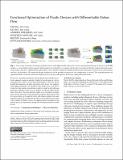Functional optimization of fluidic devices with differentiable stokes flow
Author(s)
Du, Tao; Wu, Kui; Spielberg, Andrew; Matusik, Wojciech; Zhu, Bo; Sifakis, Eftychios; ... Show more Show less
DownloadPublished version (19.42Mb)
Publisher with Creative Commons License
Publisher with Creative Commons License
Creative Commons Attribution
Terms of use
Metadata
Show full item recordAbstract
© 2020 Owner/Author. We present a method for performance-driven optimization of fluidic devices. In our approach, engineers provide a high-level specification of a device using parametric surfaces for the fluid-solid boundaries. They also specify desired flow properties for inlets and outlets of the device. Our computational approach optimizes the boundary of the fluidic device such that its steady-state flow matches desired flow at outlets. In order to deal with computational challenges of this task, we propose an efficient, differentiable Stokes flow solver. Our solver provides explicit access to gradients of performance metrics with respect to the parametric boundary representation. This key feature allows us to couple the solver with efficient gradient-based optimization methods. We demonstrate the efficacy of this approach on designs of five complex 3D fluidic systems. Our approach makes an important step towards practical computational design tools for high-performance fluidic devices.
Date issued
2020Department
Massachusetts Institute of Technology. Computer Science and Artificial Intelligence LaboratoryJournal
ACM Transactions on Graphics
Publisher
Association for Computing Machinery (ACM)